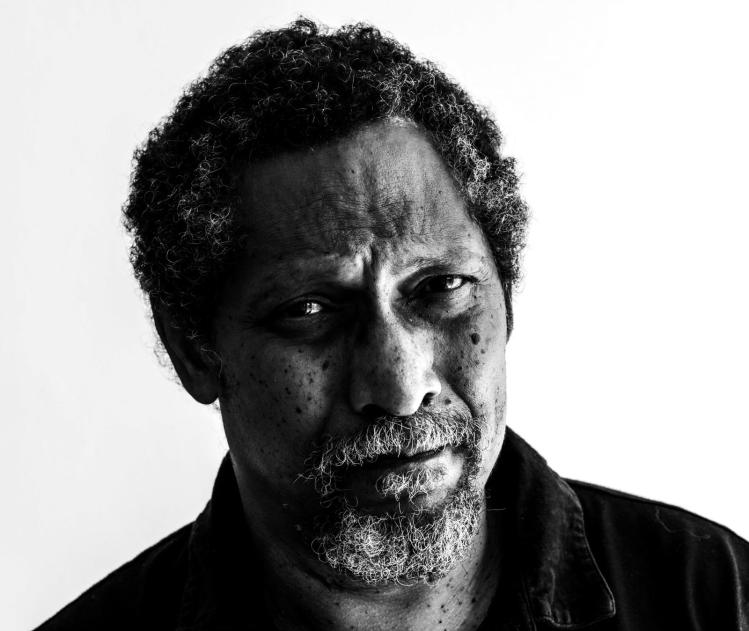
A writer’s writer! Perhaps the cruelest fate that can befall a writer. To be a writer’s writer is to be a good writer—so good, in fact, that the only readers who want to read your books are other writers, who may savor your delicious turns of phrase or envy your outsized talent. Yet for the writer’s writer himself, those enviable qualities can seem like a hindrance, keeping him from reaching a wider audience. Forget prose—what about sales?
For decades, Percival Everett has been one of our preeminent writer’s writers. Getting his start in the 1980s, he was thought of as a postmodern, or post-structural, writer. He wrote genre-bending novels, Westerns tinged with satirical humor and literary theory. This was the eighties, mind you, the decade when various (mostly French) theorists declared the death of the author. The most famous author to emerge from this milieu was David Foster Wallace, who married cerebral postmodernism with moral urgency to great effect in Infinite Jest, which made him a star. Yet that level of renown eluded Everett.
It’s tempting to deploy some kind of multi-tiered calculus to explain why Everett remained a writer’s writer, while other postmodern writers of his generation became more widely known. But, in fact, the reason is straightforward: Everett is Black. For Black writers in the United States, there are only a few paths available to reaching wide readerships, and precious few slots available to the writers lucky enough to navigate those paths. Usually, success for a Black writer has required writing something that can be described as authentic, which often means a work of realistic fiction dealing with slavery. Every so often, a Black author with a more left-field approach has managed to land on the bestseller list, as Colson Whitehead did with The Intuitionist in 1999. A science-fiction noir about a preternaturally gifted elevator inspector, The Intuitionist felt like just the sort of genre-mashup Everett was so deft at—only it was written by a younger writer, one likely influenced by Everett’s work.
Everett addressed these dynamics in what would become his best-known book, Erasure. Published in 2001, Erasure tells the story of a Black author named Thelonious “Monk” Ellison. (Everett, like Thomas Pynchon, loves to give characters silly names that sum up their whole personality.) Like Everett himself, Ellison is a Black author who writes experimental books that are deemed not Black enough by the publishing industry. Out of spite, he writes a book, under a pseudonym, that ticks off every last Black stereotype: poor, uneducated, violent, sentimental. This book, titled “My Pafology,” becomes a bestseller, is optioned for a movie, and lands Ellison on TV—ruining his life, of course. Over the years, Erasure grew into something of a cult classic, though it was never a bestseller.
Then something strange happened: Hollywood came calling. Erasure was made into a feature film titled American Fiction, written for the screen and directed by Cord Jefferson, starring Jeffrey Wright as Ellison. The film introduced Everett’s work to a larger audience than he ever had before—and he was there waiting for it with a new book.
After working with the venerable, independent Graywolf Press for more than twenty years, Everett decided to have James published by Penguin Random House. It’s a happy occasion for an Everett fan like myself, but it raises questions Everett has spent his whole career considering. Namely, what might new readers, whatever their race, find in his work? Will they understand what he has to say? And even if they don’t, is the effort still worthwhile?
James is a retelling of The Adventures of Huckleberry Finn, the Mark Twain classic. That novel, of course, follows Huck as he runs away from Hannibal, Missouri, in the company of an escaped slave named Jim, whom Huck considers his friend. When Jim is about to be sold to another owner, which would have separated him from his family, he and Huck run off. They have many adventures together, floating on a raft down the Mississippi River. Along the way, Huck has a moral epiphany, coming to see Jim as a fellow human who possesses his own rights and hopes. Such a view is, of course, anathema in the antebellum South, and Huck believes he could be condemned to eternal damnation for it. But if that’s the choice, he knows where he stands. “Alright, then, I’ll go to hell,” he says, one of the most famous sentences in American literature.
That sentence does not appear in James, which is not the story of Huck but of Jim—or James, as he prefers to call himself. This book is his account of roughly the same events that occur in Twain’s novel, related in his own voice. But this is no mere switch of perspective. Hearing James’s voice invites us to reconsider the question of how voice operates, of who is listening—and of who isn’t supposed to be listening.
A potential roadblock for readers in the twenty-first century is that, in Twain’s novel, Jim speaks in a heavily accented dialect, rendered on the page with commas and creative misspellings. Writing a whole novel in that voice now would be tiresome and, frankly, racist. Yet Everett maneuvers around that obstacle with a deft trick. It’s more than a trick, really. It’s the encapsulation of a whole outlook on American society, then and now, and the heightened awareness that living in that society as a Black man produces.
James is not, in fact, illiterate. He has secretly spent hours in Judge Thatcher’s library, reading works of philosophy and politics. He is conversant with the thinking of Locke and Rousseau. He is not alone in this, either. He has carefully taught the other slaves on the property, including his wife and daughter, the mechanics of English grammar and rhetoric. They are thoroughly, even threateningly, fluent. But they keep their fluency hidden from all the white people they encounter, because they know it would alarm them. To keep the whites from finding out, they never speak “proper” English in their presence. Early on in the novel, there’s a scene where James instructs his daughter on how to speak properly improper:
Lizzie cleared her throat. “Miss Watson, dat sum conebread lak I neva before et.”
“Try ‘dat be,’” I said. “That would be the correct incorrect grammar.”
“Dat be sum conebread lak neva I et,” she said.
“Very good,” I said.
This is very funny—and very Everett. Choosing slavery as one’s subject matter, then using that as the occasion to create the kind of running joke you might find in a Mel Brooks movie, is Everett to a T. (Everett has said in interviews that he frequently screens Blazing Saddles in his classes, causing a certain amount of discomfort among his students, who are unsure if they’re allowed to laugh.)
I must admit that I experience that discomfort too. Yes, I can appreciate the craft of it all, the well-deployed irony, the pitch-perfect voice. But let me state the matter clearly: I am a white man reading a book written by a Black author about a Black man who must hide his true voice from the white people who own him, so that they won’t kill him. That should make me uncomfortable! Statements from Black authors directed at white readers often ask those readers to do little more than listen, remain silent, and sit with their discomfort. But Everett doesn’t just want me to listen. He wants me to laugh. And I do, because the book is very funny. And in the silence that follows my laughter, I begin to see the world, and my own place in it, quite differently.
Huck and James eventually get separated. In the original story, Huck goes off with a dubious gang of riverboat gamblers, a troupe of actors, and other ne’er-do-wells. James, in James, joins a minstrel show. Minstrelsy occupies a strange place in the history of American popular culture. It was shockingly racist: white performers donned blackface and enacted the worst stereotypes about African Americans for the amusement of white audiences. It’s such a shameful episode in our history that we, being good Americans, would rather forget it ever existed.
When James is invited by the white minstrel-show leader to join their troupe, he can’t help but be suspicious. The leader of the troupe says he’ll keep James’s secret, but how much can he be trusted? Yet James’s options are few. He is a runaway slave. Wanted posters calling for his return are plastered throughout the region. Hiding among the troupe is his best chance of going unnoticed.
James then makes a startling discovery: he is not the only Black person among the troupe. Another escaped slave performs with the troupe, yet his light complexion allows him to pass for white, a virtually unthinkable phenomenon in the antebellum South. He and James concoct a plan to sell James as a slave, pocket the money, then have James run away again. They will use the money to purchase the freedom of James’s wife and daughter.
As James returns to Hannibal, and Huck appears once more, the archetypal narrative snaps into place. A man trying to return home to his family, traveling by boat, braving many dangerous episodes during the course of his adventure—this all sounds familiar. James isn’t just a rewriting of Huckleberry Finn. It’s a reimagining of the Odyssey, with James playing the part of Odysseus. The minstrel show, like the sirens in the Odyssey, nearly lures him to his doom.
This echo of one of the primal stories of Western civilization also reorients the relationship between Huck and James, to fascinating effect. In Twain’s book, Huck and Jim form a kind of mini-utopia on the raft. There is a homosocial aspect to their relationship that recalls Ishmael and Queequeg in Moby-Dick. With James in this Odyssean role, the relationship shifts. Now James relates to Huck as a father to a son. In this, Everett’s novel recalls the greatest modern reworking of Greek myth, James Joyce’s Ulysses. There, Leopold Bloom is the stand-in for Odysseus, and during the course of an eventful day in Dublin, he comes to see Stephen Dedalus as something like a surrogate son. In Everett’s book, James is Bloom and Huck is Stephen. The relationship is paternal and, therefore, not equal.
The Adventures of Huckleberry Finn suggested that, in some better world, white boys and Black men could perhaps see each other as equals. But Everett’s novel answers that, because of the very inequality and injustice that James has had to live with, he sees the world and those who live in it more clearly than Huck does. He knows, for example, how to speak to white people in a way that keeps them from worrying—and when, at the climax, he does speak in his true voice, his former owners are terrified. He is an adult, with adult knowledge of the real world. It is left to Huck, then, the eternal boy of American myth, to finally grow up.
James
Percival Everett
Doubleday
$28 | 320 pp.

